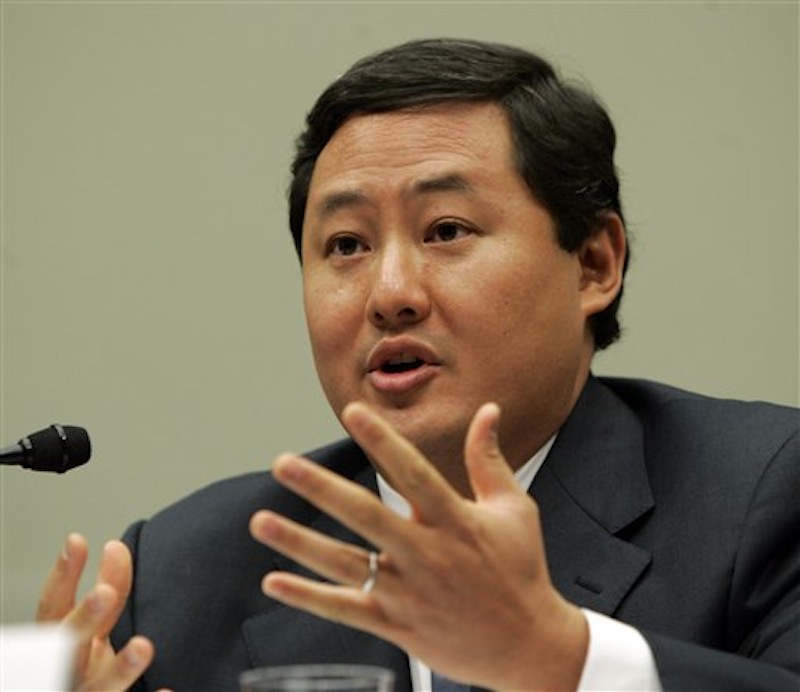SAN FRANCISCO — An appeals court on Wednesday tossed out a convicted terrorist’s lawsuit accusing a high-ranking Bush administration lawyer who wrote the so-called “torture memos”, authorizing illegally harsh treatment of “enemy combatants.”
Former Deputy Assistant Attorney General John Yoo is protected from such lawsuits because the law defining torture and the treatment of enemy combatants was unsettled in the two years after the Sept. 11 terror attacks, when the memos were written, the 9th U.S. Circuit Court of Appeals said.
The memos have been embroiled in national security politics for years after laying out a broad interpretation of executive power.
A Yoo memo from 2001 advised that the military could use “any means necessary” to hold terror suspects. A 2002 memo to then-White House Counsel Alberto Gonzales advised that treatment of suspected terrorists was torture only if it caused pain levels equivalent to “organ failure, impairment of bodily function or even death.”
Yoo also advised that the president might have the constitutional power to allow torturing enemy combatants.
Most famously, Yoo was the principal author of a memo sent to the CIA in August 2002 authorizing “waterboarding,” in which water is poured over the face of a bound detainee and simulates drowning. President Barack Obama banned its use in 2009.
The unanimous ruling of the three-judge panel reversed a lower court decision allowing Jose Padilla’s lawsuit to go forward. Padilla is serving a 17-year sentence on terror charges.
Padilla was arrested in May 2002 at Chicago’s O’Hare International Airport and charged with conspiring with al-Qaida to detonate a radioactive “dirty bomb” within the United States. President George W. Bush deemed him an enemy combatant, and he was held in military custody for nearly four years before being charged in federal court.
Padilla claims that during his military custody, he was subjected to a wide-range of harsh interrogation techniques that amounted to illegal torture. Padilla said he underwent prolonged isolation, light deprivation, extreme variations in temperature, loud noises, administration of psychotropic drugs and other techniques that he alleged were authorized by Yoo.
The memos authorized CIA interrogators to use waterboarding, keep detainees naked, hold them in painful standing positions and keep them in the cold for long periods of time. Other techniques included depriving them of solid food and slapping them. Sleep deprivation, prolonged shackling and threats to a detainee’s family were also used.
“There was at that time considerable debate, both in and out of government, over the definition of torture as applied to specific interrogation techniques,” Judge Raymond Fisher wrote for the appeals panel. “In light of that debate…we cannot say that any reasonable official in 2001-03 would have known that the specific interrogation techniques allegedly employed against Padilla, however appalling, necessarily amounted to torture.”
The appeals panel also said the trial court erred when it concluded that Padilla and other suspected terrorists held by the military enjoyed the same rights as ordinary prison inmates.
Fisher was joined by Judges N. Randy Smith and Rebecca R. Pallmeyer. Fisher and Pallmeyer were appointed by President Bill Clinton. Bush appointed Smith.
Padilla’s attorney Jonathan Freiman said he’s deciding whether to pursue further appeals, which could include asking the U.S. Supreme Court to review the case.
“Incommunicado detention, brutal treatment and death threats do not represent American values and are universally condemned,” Freiman said. “Hopefully no one else will face the horror that Mr. Padilla and his family have faced. The law should guarantee that, and the Ninth Circuit erred it concluding that Mr. Yoo’s actions were not ‘beyond debate.'”
A federal court in South Carolina last year tossed out a similar lawsuit that Padilla filed against former Secretary of Defense Donald Rumsfeld. A federal appeals court upheld that decision in January.
“The 9th Circuit’s decision confirms that this litigation has been baseless from the outset,” said Yoo, now a law professor at the University of California, Berkeley. “For several years, Padilla and his attorneys have been harassing the government officials he believes to have been responsible for his detention and ultimately conviction as a terrorist. He has now lost before two separate courts of appeals, and will need to find a new hobby for his remaining time in prison.”
An initial review by the Justice Department’s internal affairs unit found that Yoo and Jay Bybee — another high-ranking official in Bush’s Department of Justice — had committed professional misconduct, a conclusion that could have cost them their law licenses. But, underscoring just how controversial and legally thorny the memos have become, the Justice Department’s top career lawyer reviewed the matter and disagreed.
“This decision should not be viewed as an endorsement of the legal work that underlies those memoranda,” Assistant Deputy Attorney General David Margolis wrote in a memo released in February 2010.
Bybee is now a judge on the 9th Circuit Court of Appeals. He was not involved in the court’s decision Wednesday.
Send questions/comments to the editors.



Comments are no longer available on this story